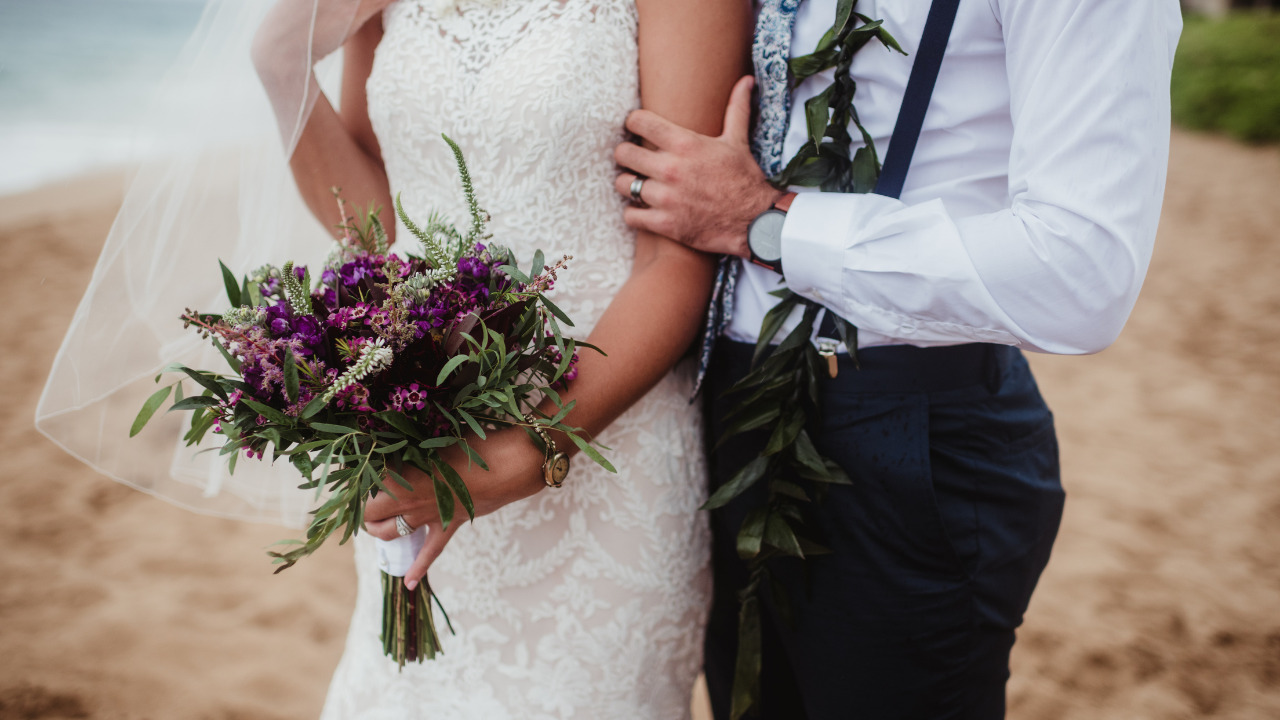Having your wedding on the beach? For shore-loving couples, there’s nothing more romantic than the sounds of the surf, the sand between your toes and the sultry, salt-tinged air as you say your vows. And if you want to invite the whole gang, think about a fun-filled wedding weekend and reunion at an activity-rich resort, beach or lakeside town. Whatever you decide, beach weddings are often memorable, unique and offer a plethora of options. But to make sure everything goes off without a hitch, here’s what you need to know.
Location, Location, Location
Choose a location based on your wedding style and nonnegotiable guest list (if that’s important to you). If you live near a beach, you might already have a favorite spot in mind. A few types of beach locations:
- Resort: A restaurant, hotel or club located right on the beach can give you the water views you crave and a reception venue complete with full staff to help you pull it all off. This option might be pricier than pulling it off yourself, but vastly less stressful.
- Public beach: A beach where anyone can swim, sunbathe or yes, get married. Start early when planning this type of affair—you may be able to reserve a section of the beach for your wedding. Look into the permit requirements of the state or town. For example, some public beaches’ parks commissions may require you to detail explicitly all pieces of equipment you’ll be bringing to the site, as well as all food and beverages to be served there. Remember you’ll also need to have a plan in place for clean-up.
- Private beach: If you—or a generous friend or family member—has a home on a private beach, you’re in luck. This option offers seclusion and possibly fewer regulations. You may also have the option of renting a villa or other space along a private beach where you can host your nuptials. If you’re marrying on a private beach, look into any permit fees, container laws and clean-up charges.
Destination Beach Wedding
Considering a wedding at a beach that isn’t close to home? A destination wedding is a fun way to get married while you, your family and friends are all on vacation together. Unlike a hometown affair, you can’t assume everyone will be able to attend, especially if the journey is far and costly.Planning a destination wedding starts with choosing a destination, of course. Your beach wedding could happen almost anywhere in the world, like the Caribbean, Mexico, Europe, Fiji, New Zealand and South Africa. Need help narrowing it down? DestinationWeddings.com helps you easily research over 1,200 properties in 42 countries to help you make the best pick for your celebration.Once you choose a destination, you’ll want to choose a venue that fits your style, party size and budget. It’s a good idea to take a trip there, in advance, to check out options in person before committing.
Wedding Planner
While it may seem like getting married on the beach will be a figurative breeze, we recommend hiring a planner to handle the unforeseen logistics of a beach wedding. Whether you need a permit for a specific area, or you need someone to handle hordes of sunbathers plopped down where your altar will be, it’s good to have a pro on hand to help with these sticky situations.
Work with a bridal consultant who specializes in beach weddings, since they’ll have the know-how you need to pull of this type of shindig.
For a destination wedding, it’s important to get a wedding planner based in the area where you’ll be married to help you navigate a particular beach’s requirements (since these can vary by county and within towns). Planners also serve as expert eyes for finding—and overseeing—local vendors.
Time of Day
Afternoon heat can be brutal in many seaside locales. But even if you’re okay standing there glistening, think of your guests. High temperatures are not for everyone, especially older folks and young kids. To avoid the heat (and crowds), consider a morning or sunset ceremony. Can’t schedule your ceremony at one of these times? Go ahead and have it in the afternoon, but find a shady spot on the beach that’s likely to catch a cool breeze. Check what the weather will be like, and inform guests on your wedding website so they can dress accordingly. Also check the tide schedule online: Tides coming in are noisier than going out—not to mention the risk of water creeping up on you as you wed.
Hotel Block
If guests are traveling to your beach wedding, reserve a block of rooms at a local hotel, so they don’t have to research where to stay. You can often get them a discounted rate too. HotelPlanner.com can help you find and compare hotels in the area and get you competitive rates for your guests.
Photography
First off, you’ll want to find a photographer who’s shot beach weddings. Shutterbugs not experienced with beach photography may be unfamiliar with the proper lighting techniques. Also, take advantage of the beauty of your natural surroundings: waves crashing in the distance, a sunset backdrop beside the water’s edge. For great candids, loosen up. Kick the sand, turn a cartwheel or simply stroll hand in hand. In addition, prepare a list of must-have shots in advance.
What to Wear
Typically, beach brides don’t opt for a ball gown because they might be too cumbersome and look overly fussy. Seaside weddings call for a gown made of lightweight fabric—anything else and you’ll be weighed down and hot. Also, remember: It could be windy. A long veil and long hair could get blown into your face. An updo could be a good choice to keep your tresses tame.
Grooms and groomsmen often sport linen suits, but if it’s really hot, guys can forgo the jacket and wear a loose shirt and pants. For the bridesmaids, light, airy fabrics are key; for comfort, try cotton, crepe or linen. We think nothing says “beach wedding” like a simple sarong or sundress blowing in the breeze.
Ceremony Smarts
If you’ve chosen a relatively unknown section of beach, make sure guests know how to find it and can traverse any boardwalks, rocky areas or grassy dunes. Consider accessibility for differently abled guests. Is there somewhere close where they can be dropped off?
- Place a welcome table at the entrance to your ceremony site. It can contain:
- Items to make guests more comfortable, such as sunscreen, bug spray, parasols or cozy beach blankets.
- Refreshments, such as homemade lemonade or ice water, to stay hydrated.
- A basket to deposit shoes, so they can go barefoot in the sand.
- Baby powder—it helps get the sand off their feet postceremony.
Plan to arrive to your site a few hours early to be sure the setup goes off without a hitch. Try to relax and stay hydrated yourself—you don’t want to start wilting during the ceremony.
Décor Elements
A fun part of planning a beach wedding is choosing décor elements that complement your seaside setting. Seashells, starfish, nautical ropes, anchors, lanterns, sea glass and driftwood are all pretty and on-theme touches. A few considerations as you choose yours:
- Ceremony: If the ocean is your ceremony backdrop, there’s no need to get too fussy with the décor. A simple chuppah or arch can do the trick, or just let the beauty of the water speak for itself. Forget the unity candle and consider combining different-colored sand, or even sand and water.
- Reception: If tables are outside, consider the wind. Tablecloths and other lighter items, like place cards, should be weighted so they don’t blow around. Candles and ribbons should probably be avoided completely.
Flowers
Beautiful blooms add bursts of color to any space, including the beach. Consult with a local florist to choose the right flowers for your fete—some island locales might have limited options.
Direct sunlight and heat are no-gos for many blossoms, and you’ll want flowers that last. Those that wilt easily, like freesia, poppies and bouvardia, aren’t good choices. But gorgeous orchids, chrysanthemums and plumeria are surprisingly hardy and hold up well in almost any kind of weather. Or opt for non-floral décor. For beach-themed centerpieces for example, fill large conch shells or colorful beach pails with your chosen flowers.
Food & Drink
A beach wedding in Hawaii will be quite different from a seaside ceremony in the South of France, and your menu can reflect that. Incorporate foods and customs of the area. Hawaiian weddings, for example, can involve local delicacies such as poi and roast pig. Similarly, Caribbean choices include jerk chicken, and almost any beach locale can offer fresh seafood. When selecting your menu, also consider the temperature—many foods will spoil in the heat. For example, a raw bar is best done inside where there’s air-conditioning. Many fresh fruits and veggies can go bad if left in the sun, and cheese will melt. Cocktails can be made with tropical or local flavors as well. In hot weather, instruct servers to keep guests’ water glasses full so they don’t get dehydrated, and don’t get too tipsy from drinking alcoholic beverages quickly.
Cake
A beach wedding cake can be accented with sugar sand, shells, palm leaves or tropical blooms. Or have your baker create an ombré design that resembles a beach sunset.
As far as frosting goes, fondant is a better choice than buttercream, which will melt in the hot temps. Choose coconut cake, citrus or passion fruit filling, or other flavors local to your beach setting.
Backup Plan
We can’t stress this enough: Always have a back-up plan for any type of outdoor wedding.
We know the last thing you want to do is scrap your wedding fun in the sun at the last minute, but sometimes Mother Nature doesn’t cooperate. Renting a tent is always recommended in case of light rain or needed shade. For backup in the event of a complete washout, make arrangements in advance with a nearby hotel or hall as an alternate locale.
Also, don’t feel compelled to organize the day on a drill sergeant’s time schedule. If you need to be on a rain delay for a couple of hours, the rest of the day can still proceed as planned.
Disclosure: This post contains affiliate links, some of which may be sponsored by paying vendors.



